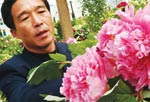Society
The heat is on
Updated: 2011-03-14 07:58
By Wang Ru (China Daily)
|
For some Beijingers, a visit to old bathhouses is a part of their lifestyle. |
Beijing's bathhouses have all but disappeared. Will the few survivors escape the bulldozer? Wang Ru reports.
It's 6:30 am and 54-year-old Feng Qingping is the bathhouse's first customer. Heaving a sigh of pure pleasure, Feng, who works as a driver for a transport company, lowers himself into the steaming pool and as the warmth of the water courses through his veins, breaks into a song.
For bathhouse patrons like Feng, nothing quite beats a steamy dip first thing in the morning.
Located by Nanyuan Airport in southern Beijing's Nanyuan, in Fengtai district, Shuangxingtang, which opened in 1916, has been an iconic symbol of traditional Beijing lifestyle for close to a century.
 |
For residents, especially elderly Beijingers, a visit to the bathhouse is not just about the "bath", it is as much about leisure and relaxation - playing Chinese chess, watching crickets fight and singing Peking Opera.
Emerging from the pool, Feng heads for a shower before settling down on a wooden bunk in the rest hall, with a cup of tea and a cigarette.
This is his twice-weekly ritual and he usually spends a whole morning with his friends.
"I feel uncomfortable until I have stepped into the pool and scrubbed away all the dirt," Feng says.
It was his father who first took him to the bathhouse, 50 years ago.
"It only cost 2 jiao (3 cents) to bathe here. My father also liked to brew a pot of tea for 1 jiao. The most expensive tea today cannot match its flavor," he says.
"If the bathhouse goes, I will have nowhere to escape my hard life for a while, and will lose all those memories of my childhood and old friends."
Shuangxingtang seems fated to suffer the fate of other old bathhouses in Beijing that have been demolished.
But news that the owner is trying to get the bathhouse included in the list of the nation's national intangible cultural heritage is now offering a small ray of hope that it may survive.
During the Qing Dynasty (1644-1911), Nanyuan served as part of the imperial hunting grounds. As the city's south entrance, it became a crucial military zone from the late 19th century, where many army divisions were stationed, including troops of the late Qing Dynasty and the armies of warlords.
Restaurants and open markets boomed to meet the growing needs of residents and soldiers. In 1916, Wang Shuangkui built a two-floor bathhouse and named it Shuangxingtang, combining the first word "Shuang" of his given name and wishing it "xing" (or prosperity).
During the turbulent war years, the bathhouse, with its large pools, wooden bunks and lockers in the rest hall, a barbershop and a dining hall, thrived by catering to the soldiers and local residents.
After the founding of New China, Shuangxingtang's ownership passed into the hands of the State and its name was changed to Nanyuan Bathhouse.
In 1999, Zhang Yang's Shower, a touching story about an old man who runs a public bathhouse with his sons, was shot at Shuangxingtang. The film's posters can still be seen hanging on the walls of the bathhouse's rest hall.
In 2003, the bathhouse again changed hands when it was bought by Xiong Zhizhong, a 47-year-old from Heilongjiang province, whose twin fascinations since childhood have been water and old buildings.
Xiong moved to Beijing in 1996 in search of business opportunities. He opened a restaurant in Qianmen Street serving traditional Beijing food such as chao gan (fried pork livers) before taking over the bathhouse.
Xiong not only restored its original looks but also gave it back its old name - Shuangxingtang. To make ends meet, he opened a KTV and massage shop inside the building. According to him, the bathhouse now turns an annual profit of around 200,000 yuan ($30,400).
"It is not a big deal to lose a business, but what we are losing is our culture," says Xiong, of its proposed demolition. He once flew to Bali for a taste of its famed spa culture and concluded: "My 8 yuan bath is better than the $800 spa."
"Stepping into the hot water and watching the steam rise to the roof will make your forget all your troubles," Xiong says. Shuangxingtang now sees 200 customers a day, with the pool jam packed at the weekends and the eve of Spring Festival.
Tan Xing, 64, even moved house in 2010 for the express purpose of being able to visit the bathhouse thrice a week, a 20-minute walk from his house.
He says since he began visiting Shuangxingtang three years ago he has quit gambling.
"Now I believe the old saying that 'rich people go to see a doctor and the poor to the bathhouse'," Tan says.
"I have not caught a cold since bathing here."
The customers of the bathhouse come from all walks of life and include grandparents with their grandchildren, soldiers and retired scientists. Some come in their limousines, while others arrive after a 90-minute bus ride.
"It is a place where we face each other naked without (being conscious of) differences in social class and wealth. We joke about everything and laugh loudly, something we cannot do either at work with colleagues or at home with our children," Tan says. "I feel totally relaxed and comfortable here."
While the bathhouse may seem unsanitary and crowded, its loyal fans would not have it any other way.
Xiong recalls meeting an old man from Taiwan, back in 2005, in the bathhouse. The man, who was born in the town and left the mainland as a Kuomintang soldier, came back to visit his hometown for the first time after more than 50 years.
"He told me that he had bathed here in his childhood. The bathhouse was the only memory of his hometown," Xiong says.
He says if the bathhouse survives, he will restore everything in Shuangxingtang to how it was a century ago.
E-paper

Rise and shine
The Chinese solar energy industry is heating up following recent setbacks in the nuclear sector
Bombs aim for regime change
CSI, with a twist
Literary path
Specials

Peony express
Growers of china's unofficial national flower are reaching out to europe for help

Tea-ing up
More turning to Chinese tea for investment opportunities like vintage wine

A cut above
The ancient city of Luoyang is home to a treasure trove of cultural wonders.

